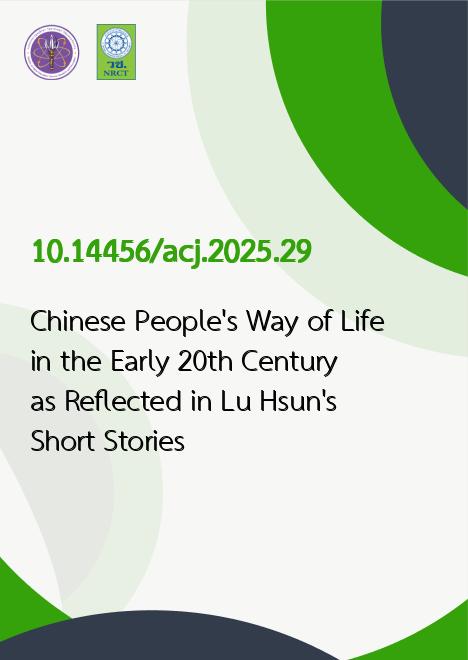
|
Chinese People's Way of Life in the Early 20th Century as Reflected in Lu Hsun's Short Stories |
|---|---|
| รหัสดีโอไอ | |
| Creator | Truong Thi Hang |
| Title | Chinese People's Way of Life in the Early 20th Century as Reflected in Lu Hsun's Short Stories |
| Publisher | The Office of Arts and Culture, Surindra Rajabhat University |
| Publication Year | 2568 |
| Journal Title | Arts and Culture Journal of the Lower Moon River |
| Journal Vol. | 14 |
| Journal No. | 2 |
| Page no. | 395-410 |
| Keyword | Lu Hsun, Short Stories, Way of Life, Chinese People, Early 20th Century |
| URL Website | https://so07.tci-thaijo.org/index.php/acj |
| Website title | วารสารศิลปะและวัฒนธรรมลุ่มแม่น้ำมูล |
| ISSN | ISSN 2822 - 0617 (Online);ISSN 2822 - 1141 (Print) |
| Abstract | This research aims to study Chinese people's way of life in the early 20th century through 16 short stories by Lu Hsun. The research results reveal 5 aspects of Chinese people's way of life : In terms of language use, there was the use of archaic vocabulary among intellectuals who received traditional education and the use of English, which was popular among intellectuals who received modern education. In terms of dress, ordinary Chinese people favored cloth shoes and men wore long braids as in the feudal era, while new intellectuals wore leather shoes, women favored shirts that revealed their arms and high-heeled shoes, and men wore suits and cut their hair short following Western ways. In terms of medical treatment, Chinese people viewed human illness as related to supernatural forces and elemental systems. Treatment methods included both traditional remedies such as eating human hearts and consuming steamed bread soaked in human blood, as well as Western medical treatment. In terms of education, Chinese people adhered to the concept that women should not study and emphasized family upbringing with importance placed on the teachings of fathers or eldest brothers. Educational materials in China during the early 20th century were few in number and mostly outdated. Although Western education began to attract interest in contemporary society, it had not yet produced tangible results. In terms of beliefs, Chinese people held beliefs about supernatural forces, including deities and spirits of the deceased, as well as beliefs about auspiciousness and inauspiciousness. |